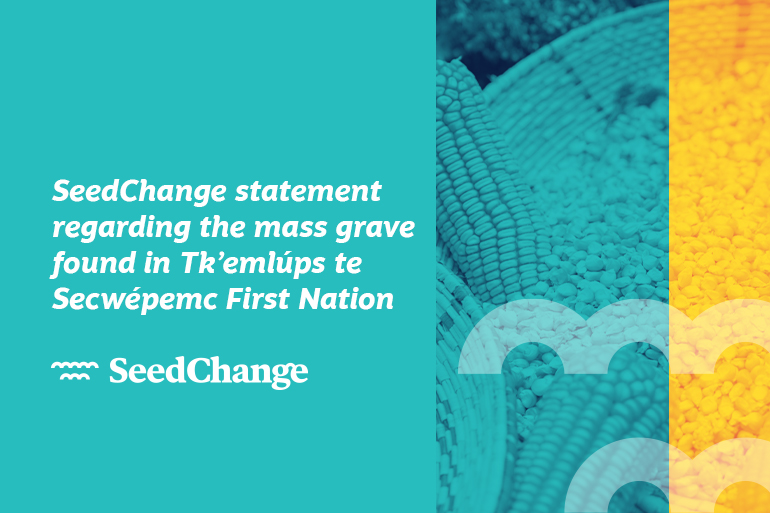SeedChange statement regarding the unmarked graves found in Tk’emlúps te Secwépemc First Nation
June 1, 2021To be silent at this time is to be complicit in denying the ongoing reality of settler colonialism.

Last week, the remains of 215 children were uncovered on the site of the former Kamloops Indian Residential School in Tk’emlúps te Secwépemc First Nation. SeedChange extends our love and care to residential school survivors, their families and descendants, loved ones and communities during this time of deep grief.
To be silent at this time is to be complicit in denying the ongoing reality of settler colonialism. The work of making change is the responsibility of those who benefit from these systems. SeedChange is responsible for identifying how colonialism is embodied within our organization and in our work with partners and communities, and to make systemic changes within our organization to dismantle policies and practices that cause harm. We are committed to this work.
Alongside our own commitments, SeedChange calls on all levels of government to act on the Truth and Reconciliation Commission’s report and all 94 calls-to-action. This includes calls-to-action 43 and 44, that the government adopt and implement the United Nations Declaration on the Rights of Indigenous Peoples (UNDRIP) as the framework for reconciliation, and take concrete measures to achieve the goals it outlines.
We urge settlers to the territories across so-called Canada* to work toward these calls-to-action in our workplaces, organizations, schools, and daily lives.
This is not history. The last residential school closed in 1996, the federal government continues to spend millions fighting residential school survivors in court, and Indigenous children are hugely overrepresented in foster care. In 2018, just 0.5 per cent of charitable giving went to Indigenous groups. That means Indigenous groups receive about $1 for every $178 given to non-Indigenous groups.
The barrier to reconciliation and decolonization is not that the challenges are too hard or too complex. Simply put, this has not been a high enough priority for our institutions, our governments, or the voters who elect them. We must do better.
There cannot be reconciliation without truth.
There cannot be reconciliation without restitution.
There cannot be reconciliation without action by settlers to dismantle systems that oppress and harm.
Signed by Executive Director Jane Rabinowicz on behalf of SeedChange
If you or someone you know requires support during this time, please reach out to:
The Indian Residential School Survivors Society at 1 (800) 721-0066 or the 24hr Crisis Line at 1 (866) 925-4419.
* Why do we use the term so-called Canada?
Language needs decolonizing, too.
Since time immemorial, Indigenous Peoples with their own place names and languages have lived on these lands. The name Canada is the colonial name for these lands, and this name has existed for a small fraction of the history of the place(s) it refers to. The people Indigenous to these territories are still here, living under colonization. While it is necessary in many cases to use the name Canada to refer to the political boundary of the country, the qualifier “so-called” speaks to the fact that this is not the name Indigenous peoples use for these lands.
For more perspectives on the word “Canada,” listen to episode one of Kaniehti:io Horn’s Telling Our Twisted Histories, a new podcast about decolonizing our minds one word at a time.
For more information about Indigenous territories across Turtle Island and beyond, visit Native-land.ca.